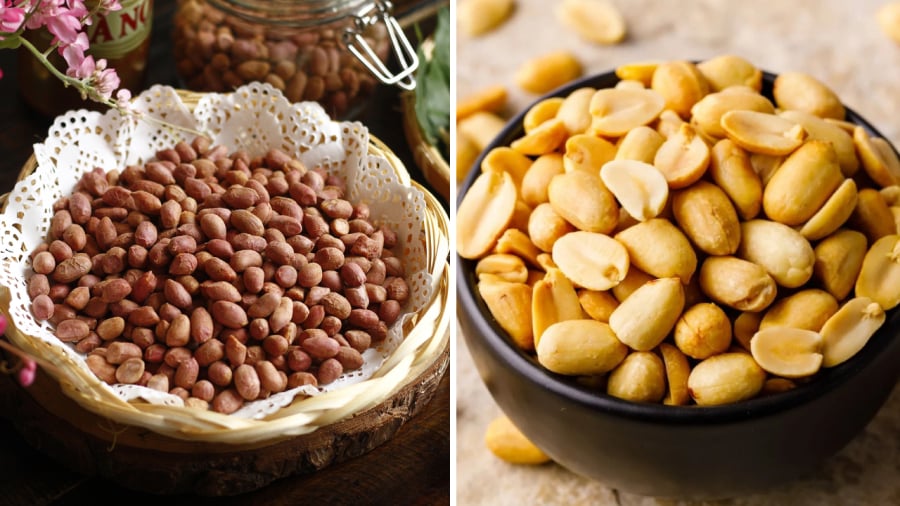Peanuts: The Longevity Nut with More Protein Than Beef
Peanuts, also known as groundnuts or monkey nuts, are a versatile legume that can be enjoyed fresh or dried. They are a popular ingredient in many delicious dishes and, as this article will explore, they offer a wealth of nutritional benefits that support overall health and well-being.
According to the Health and Life newspaper, peanuts contain a significant amount of healthy fats and lipids (around 50 grams per 100 grams of peanuts). They are an excellent source of energy and, as noted by nutritionist Boris Hansel, they provide more protein than almonds or cashews.
In fact, peanuts contain even more protein than beef. While 100 grams of beef contains approximately 18 grams of protein, peanuts offer a higher proportion of this essential macronutrient.
Additionally, peanuts are rich in minerals such as potassium, manganese, zinc, copper, iron, calcium, and selenium. These minerals play crucial roles in maintaining optimal health and supporting the proper functioning of the body’s systems.
Peanuts are also a low glycemic index (GI) food, making them a suitable snack for people with diabetes.

Health Benefits of Peanuts
- Improve Heart Health
Peanuts are rich in monounsaturated and polyunsaturated fats, which are known to promote cardiovascular health. They also contain oleic acid, which helps increase levels of good cholesterol while reducing bad cholesterol in the blood. This can help prevent heart disease and reduce the risk of stroke.
- Boost Brain Function
Peanuts are a good source of vitamin B3 and niacin, which are essential for brain health and memory enhancement. Additionally, the flavonoid resveratrol found in peanuts can improve blood flow to the brain.
- Aid in Weight Loss
The high fiber and protein content in peanuts helps promote satiety and reduce cravings. This can lead to better control over eating habits, making it easier to manage weight and achieve weight loss goals.
- Diabetes-Friendly
With their low glycemic index, peanuts are a safe snack option for people with diabetes. They are also rich in manganese and copper, which play important roles in fat and carbohydrate metabolism, calcium absorption, and blood sugar regulation.
- Reduce Stress
Peanuts contain tryptophan, an amino acid that helps the body produce serotonin. Serotonin is closely linked to mood regulation, and this chemical compound helps maintain alertness and calmness.
- Promote Healthy Skin and Hair
The monounsaturated fats, vitamin C, and vitamin E in peanuts help slow down the aging process. Additionally, the B vitamins in peanuts support the conversion of biotin, which stimulates hair growth.

Precautions When Eating Peanuts
Despite their health benefits, peanuts have a high-fat content and should be consumed in moderation. Experts recommend limiting peanut consumption to no more than 10 grams per day. Excessive peanut intake can lead to digestive discomfort, such as bloating and gas.
It is also important to note that peanuts are prone to mold, so proper storage in a cool, dry place is essential. Moldy peanuts can produce aflatoxin, a toxic substance that has been linked to cancer.
Who Should Avoid Eating Peanuts
- Individuals with Allergies
While peanuts are generally healthy, they may not be suitable for everyone. Some people have a natural allergy to peanuts, and even a small amount can trigger mild reactions such as itching, nausea, and facial swelling. In more severe cases, peanut allergies can lead to anaphylaxis, with symptoms including difficulty breathing, nausea, vomiting, swelling of the tongue, lips, and face, and chest tightness.
- People with Gout
Gout is a condition characterized by purine metabolism disorders, resulting in elevated uric acid levels in the blood. During acute gout attacks, it is advisable to avoid high-fat foods like peanuts as they can hinder the excretion of uric acid and worsen the condition.
- Individuals with Dyslipidemia
Due to their high-calorie and fat content, peanuts should be consumed in moderation by individuals with dyslipidemia or high blood lipid levels. Excessive consumption can exacerbate the condition and increase the risk of heart disease.
In conclusion, peanuts offer a plethora of health benefits and are a cost-effective addition to a daily diet. However, as with all foods, moderation is key to reaping the rewards while minimizing potential risks.
The Ultimate Omega-3 Rich Fish: An Affordable Superfood Delight
When it comes to omega-3-rich foods, salmon often springs to mind, with its impressive 2,150mg of omega-3 per serving. However, what many people don’t realize is that there’s another type of fish readily available in Vietnam that rivals salmon in its omega-3 content. Step forward, herring! This humble fish boasts an impressive 2,150mg of omega-3 per serving, putting it on par with salmon as a superb source of these essential fatty acids.
“A Hearty Soup: Canh Rau Ngót Nấu Thịt Bằm, a Delicious and Nutritious Treat”
Are you craving a delicious, nutritious, and easy-to-prepare soup? Look no further than Water Mimosa Soup with Minced Meat. This mouth-watering dish is not only packed with flavor but also boasts an impressive nutritional profile. With its combination of tender minced meat and the delicate, nutrient-rich Water Mimosa leaves, this soup is a true delight for your taste buds and your body. The soup is known for its liver-nourishing properties, aiding in bile function, and boosting your body’s calcium levels. It’s a perfect choice for a quick, tasty, and healthy meal.



































